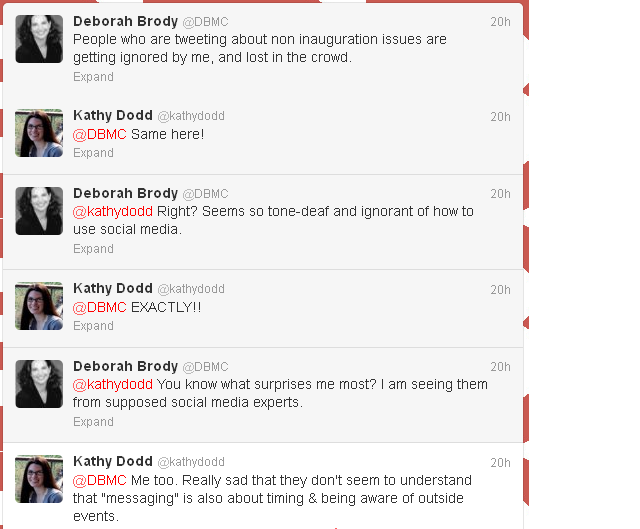It seems that there are lots of people out there who either don’t know how to use Twitter or don’t really care. Their behavior –from ignoring people to being excessively self-promotional– is just plain obnoxious. “In real life” if you engage in obnoxious behavior, people start avoiding you, right?
These are a few obnoxious behaviors that you should avoid:
Behavior: Not responding to @ mentions
Why this is obnoxious: Someone is trying to talk to you. In person, would you ignore someone who is speaking to you?
Behavior: Retweeting every comment that includes a mention of you
Why this is obnoxious: It is clear that you are trying to make sure your followers know that others have mentioned you. In person, what would you think of someone who is constantly saying, things like “Joe really likes me, and told me so.”
Behavior: Bragging or posting completely self-serving tweets
Why this is obnoxious: When you are going on (and on and on) about yourself, you are acting as if the world is your echo chamber. The only person that benefits from your behavior is you.
Behavior: Following people but never interacting with them
Why this is obnoxious: If you are interested in following someone, perhaps it is because you enjoy what they share or have to say. When you don’t COMMUNICATE with that person, you are giving absolutely no reason why that person should follow you or value your follow.
Behavior: Never interacting with anyone at all
Why this is obnoxious: Would you go to a party, stand up and start talking and ignore everyone else in the room? Would you show up to a networking event and not speak to anyone? Why are you there? Presumably, you are there because you want to speak with other people–not to or at them.
Behavior: Scheduling Tweets
Why this obnoxious:: When you schedule Tweets you are using Twitter as a place to dump information rather than a place to interact with people. It takes the social out of social media.
Behavior: Automatically Tweeting your check-ins
Why this is obnoxious: Do you walk around announcing yourself everywhere you go? “Hi, I am at the corner of Main and Elm. Hi, now I am dropping my clothes at the dry cleaners. Hi, now I am stopping at the drugstore for my seizure medication. Hi, now I am picking lint off my jacket while standing on line at Starbucks.”
If you don’t want to be obnoxious on Twitter, think whether you would do those things if you were to see your “Tweeps” in person. It really is that simple.
What obnoxious behavior have you encountered on Twitter?

